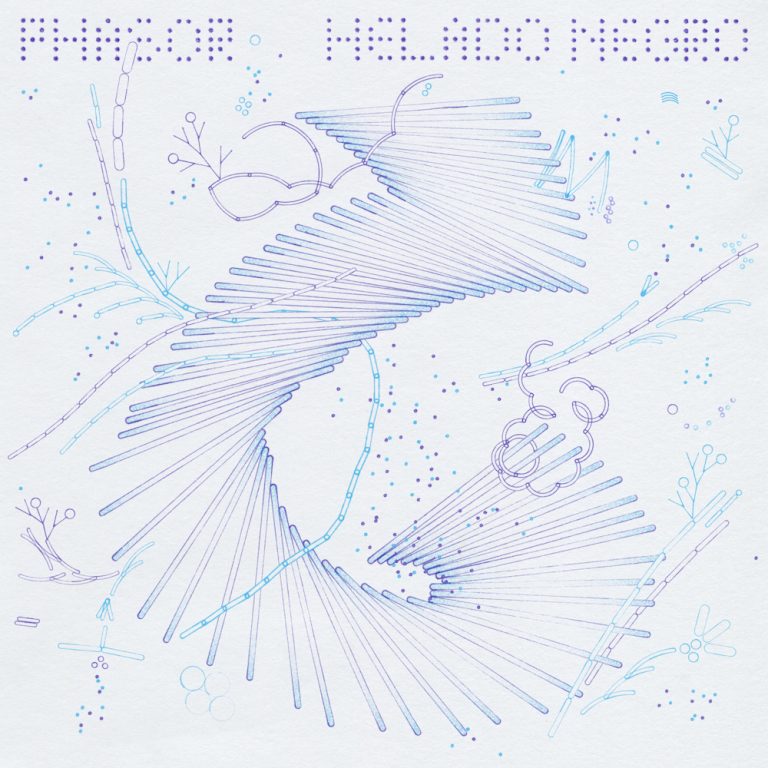The cover of 2021’s Far In from Roberto Carlos Lange, aka Helado Negro, shows a young and wide-eyed Lange bathed in rays of sunlight. The project accordingly captured Lange as he drifted from the murkier sounds of his previous album, 2019’s This Is How You Smile. With Far In, crisp beats were placed in the forefront of the mixes; melodies conveyed an optimistic verve. Lange’s vocals were airier, less muffled by reverb and weighty accents.
With his new album, Phasor, Lange revisits a melancholic gestalt, curating and fleshing out the duskier sounds of Smile. If it’s still summer in the Lange interior, it’s late August or early September rather than mid-June. Signs of autumn are apparent. Sonic tapestries are subtly discordant and mercurial, timbres more complex. With Phasor, Lange offers what are perhaps the most pensive and interrogative renderings of his career.
On opener “LFO (Lupe Finds Oliveras)”, Lange spins an alt-narrative, name-dropping Lupe Lopez, who famously worked in the Fender amp factory in the 1950s, and composer Pauline Oliveras, who coined the term Deep Listening in 1989. While the track tilts toward buoyancy, the beat lags, conjuring a languorous or drunken effect. The instrumentation is fuzzy, reminiscent of a blurred yet enticing photograph. One imagines viewing Lange through a window, hearing his voice as it wafts through a crack in the frame. Lange adeptly maneuvers an emotionally complicated locale, exploring ways to contextualize an inescapable ambivalence.
Melodically, “I Just Want to Wake Up With You” brings to mind the Far In earworm “There Must Be a Song Like You”, though with the former, Lange’s voice is more rueful, the beat lurching, the atmosphere clattery. Lange skillfully soothes and agitates a listener, prompting a paradoxical response. The track spotlights Lange’s lingering lo-fi and DIY impulses, apparent as far back as his 2009 debut Awe Owe (though perhaps best illustrated on 2011’s Canta Lechuza and 2013’s Invisible Life). If “There Must Be A Song Like You” celebrates love attained, “I Just Want to Wake Up With You” addresses unquenchable longing and amour deferred. “Best for You and Me” similarly employs lo-fi synths, the mix slightly overdriven, yielding a thin frame of distortion, another production move Lange has applied throughout his oeuvre.
“Echo Tricks Me” unfurls with a loungey groove, a mesmerizing blend of woozy cum mechanistic drums, synths, and electronic doodling. The lines “Words sneak past your teeth / lies come true when you’re dressed in blue” land as dadaistic graffiti that could’ve been penned by a despondent Mark Linkous or sardonic Dan Bejar. “Out There” is likewise a barbed take on the loss of convenient clarities. “I don’t have excuses / I lost all my reason”, Lange confesses, his watery voice juxtaposed with a trebly bass and energetic percussion.
If Far In underscored Lange’s proclivity for enchantment, the glitchy “Wish You Could Be Here” depicts his upbeat sensibilities largely eclipsed by serrated textures and roiling accents. Additionally, this is no one-dimensional serenade; Lange is looking for more than prelapsarian love. There have been significant personal and collective losses, and the world, ever-demanding, is faced with myriad crises. Circumstances and desire are often incongruent. Whereas a love song used to be simply a love song, it’s now also a preemptive defense, a strategic monologue, a loaded check-in.
The album ends with the exquisite “Es Una Fantasia”. The track’s opening headlines Lange the consummate troubadour, his voice complemented by a flamenco-style guitar and brushy drums. As the song progresses, Lange’s lead vocal intermingles with his echoey back-up parts. The piece epitomizes his affinity for malleable soundscapes and buttery vocals; and yet, his voice is occasionally strained, as if he’s about to break into tears. The instrumentation, too, leans toward an abstract solemnnity, recalling a painter who intends to use yellows and reds but instead finds himself operating with grays and blacks. Lange struggles to reconcile love, fantasy, and doubt, recognizing that the version of intimacy hyped by fairytales, Hollywood, and the media has little to do with the way things actually are.
It’s thrilling to witness Lange as he hones moodier sounds and integrates a broader range of psychological states. Resilience and sorrow, embodiment and dislocation, hope and prudence are present and well-articulated. Sonics are at once pop-inflected and ambiently experimental. Lange’s voice is at its most resonant. With Phasor, Lange navigates an important rite of passage, testifying to life’s glories and anticlimaxes. He’s become an unflinching realist without sacrificing his curiosity, his capacity for wonder.


